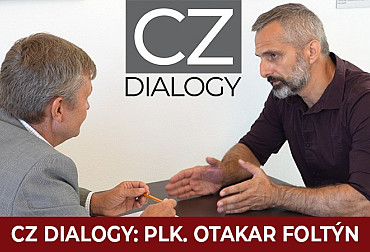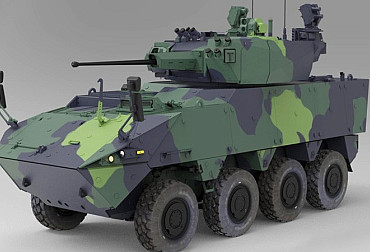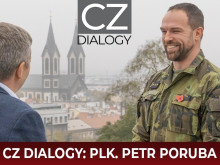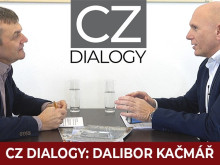Gen. Roman Hyťha: Russia still surprises us in a way
The tasks of the Intelligence Staff of the Chief of the General Staff of the Czech Armed Forces and the management of the development and achievement of capabilities in the field of intelligence security of the Army are the task of the Intelligence Security Section of the Army of the Czech Republic of the Ministry of Defence. Its director is Brigadier General Roman Hyťha. His tasks include the comprehensive exploitation and development in the field of intelligence, reconnaissance, electronic warfare, geographic security and hydro-meteorological security, including the creation of required strategic intelligence products. General Hyťha is also the expert guarantor within the Ministry of Defence responsible for the development of unmanned systems and is the focal point for global navigation satellite systems. We asked the General for an interview as part of the next episode of our CZ DIALOGUES program.
Video: Interview with the Director of the Intelligence Security Section of the Ministry of Defence Brig. Gen. Roman Hyťha / CZ DEFENCE
General Hyťha gained his professional background and experience not only at the Military University of the Land Army in Vyškov, where he graduated as a Commander of Reconnaissance Units, but also in many international courses, e.g. in Germany and Belgium. These courses were mainly focused on special operations planning and intelligence support to these operations. In 2015 he participated as an expert witness in the evaluation of a newly introduced NATO course on Human Network Analysis in support of Targeting. Also important for him was the assignment with the 601st Special Forces Group of the Czech Armed Forces.
The activities of the Army Intelligence Section are linked to other branches of the Army, in particular the Territorial Forces Command or the Military Intelligence. "From a strategic level, we supervise and communicate seamlessly on a daily basis with our expert subordinate units. And as far as the Military Intelligence is concerned, there is very close cooperation, they work hand in hand with us in briefing the main officials of the Army of the Czech Republic. We create intelligence information and outputs together. We also work together on a daily basis," says General Hyťha, who also adds that the approach of the intelligence team is constant activity. "We try to be proactive. One of the functionalities we have is warning of certain events that may occur in the world that will affect the security of the Czech Republic, the European Union and NATO as alliance partners," adds the director of the Ministry of Defence's Intelligence Security Section.
It is the fulfilment of the intelligence function that determines the way of work, where it is not only about the information that the section procures by its own activities, but also about the information it receives from other cooperating entities. So we get some intelligence and then we have our own analytical capability, so we're not just passively receiving the information and reporting on it, but we're assessing it within our context and those things that we see. And of course, open source intelligence is an integral part of intelligence these days," General Hyťha said in an interview.
As mentioned earlier, intelligence officers are also "looking" beyond the border with a focus on pursuing military priorities. Historically, this has included areas such as Afghanistan and Mali. It was the intelligence activity in Afghanistan that foreshadowed later events, an experience that then guides intelligence activities. "In the world, it is necessary to identify whether or not the events in question have a direct impact on the security of the Czech Republic, the EU, NATO," says Brigadier General Roman Hyťha.
The current situation in Ukraine, or Russia's war activities, is also a source of such experience. "The truth is that Russia still surprises us to some extent. This is due to the fact that we follow the indicators of certain things that are happening, put them in context and try to determine what is going on. And with Russia, I have to admit that we have been surprised several times by what it has ended up doing. For example, we knew based on certain indicators that there was going to be an invasion of Ukraine at some point in advance. You could say that from a military point of view, we were more and more convinced that the situation was not good and the invasion would happen," General Hyťha recalls, adding that one with his "Western view" of things did not want to believe it until the last moment.
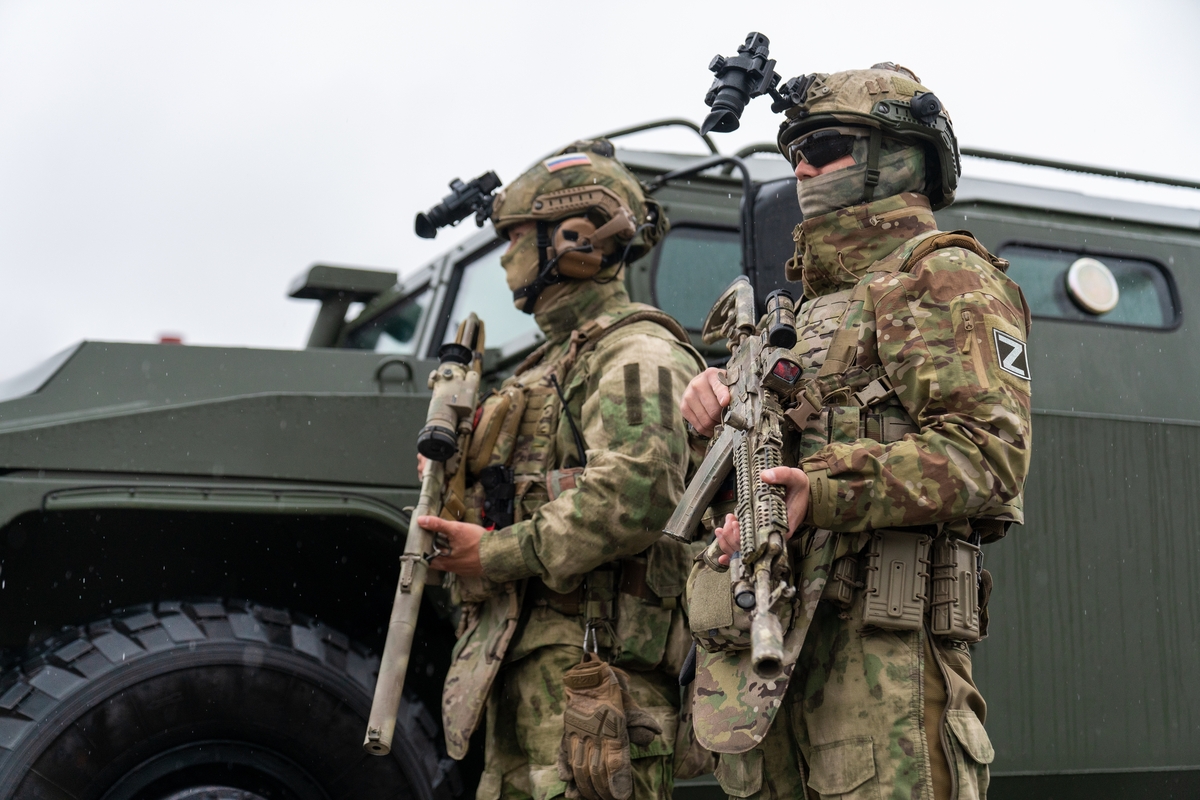
During the conversation we also touched on the atrocities committed during the war in Ukraine, for example in the village of Bucha, when General Hyťha said that "this is completely beyond our comprehension." We also recalled the situation around Kharkiv. "Russia is capable of going into something where we assess that it simply does not have the forces and resources to do so. That is the threshold of sensitivity to its own life. For them, it is somewhere else than we can imagine. This is dangerous for us, because our 'Western eyes' tell us they won't go for it, but they just go for it," General Hyťha compares the importance of the cost of human life in the West and the East.
In these days of increasingly frequent hybrid threats and cyber-attacks, an effective way of assessing information is important for intelligence work, so we were interested to see how the section is proceeding in this case. "We as intelligence officers work with a certain level of probability. I'm not saying I'm going to come home at five o'clock. I'm saying I'm most likely to come home at five," explains General Hyťha, adding that there is always some degree of unknown. Also, most information gathered does not work with just specific facts, but with certain assumptions. These are formed based on experience, doctrinal practices and other things. "The facts, of course, come mainly from the reconnaissance sensors we have. We verify information, we try to confirm or refute it, and then intelligence is built on that. Based on that, we can then tell what is probably going on," said the director of the Defense Ministry's Intelligence Section.
As in other fields, artificial intelligence is entering the intelligence landscape. Its use is proving crucial, particularly in evaluating the amount of information intelligence officers are gathering. However, according to Roman Hyťha, everything is still at the beginning. "We are opening the door to some things. It's interesting for us, and within some of the software solutions we have for analysis, there are already basic elements of things that could suggest that this is artificial intelligence. Going forward, we will be moving in that direction. We are already trialling ChatGPT as well," General Hyťha elaborates. The effectiveness of using such systems at present is mainly in gaining information about, for example, territories that are not primarily of intelligence interest. "Rather than always calling in an expert for quick intelligence information and doing deep analysis, we are already making real use of artificial intelligence elements," explains Roman Hyťha.
We mentioned in the introduction that General Hyťha's remit also includes the development of unmanned systems. Recently, the Committee on Defence of the Czech Parliament also discussed the use of drones within the Czech Armed Forces in closed mode. I would like to say here that we will try to protect more and more information in the future and we are encouraged to do so by our various companies, which are 'stochasticising' us in an interesting way. A normal person has to identify for himself that this is beyond normal enquiries," explains the General.
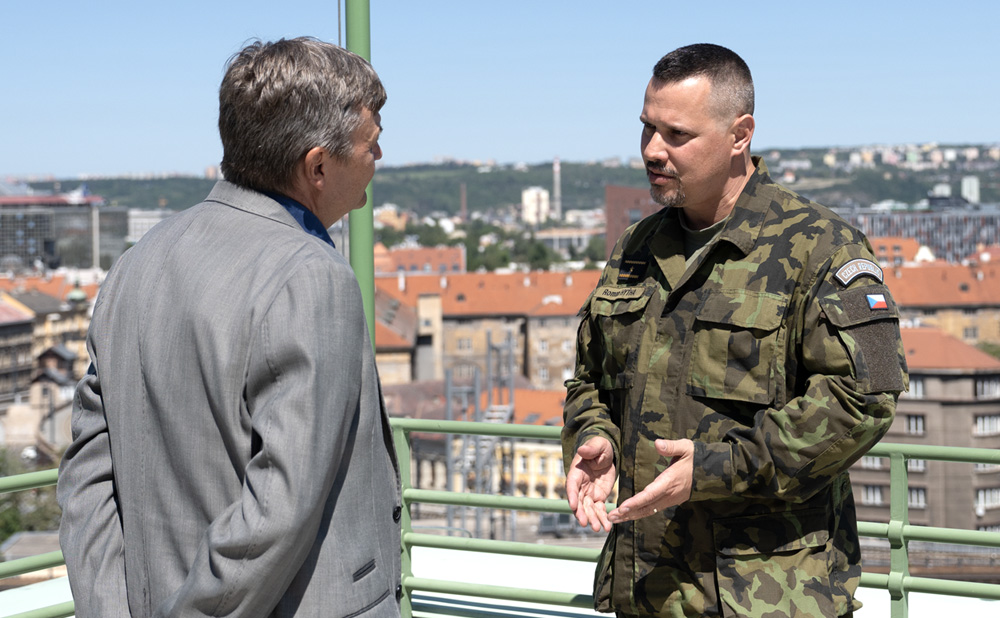
Regarding the overall strategy, regardless of the year-old intention to develop unmanned aerial vehicles, the current situation in Ukraine is the determining factor in the Czech Army today. The development of unmanned vehicles has gained such speed that all original analyses are undergoing continuous revision. The use of unmanned assets is also determined by the financial frameworks that the Army can currently afford. For these reasons, then, the Army has decided to change its view on the use of drones. "A different direction in my mind means that we will use fewer assets and increase their numbers. And we will try to get these assets into, say, conventional manoeuvre units, so that they become a normal part of their lives," clarifies General Hyťha, who says soldiers will have a smaller drone to look behind an obstacle that is in front of them, which increases the overall situational awareness of that unit.
Protecting troops from attack by aerial drones also goes through a similar process. "The Czech Army is protected to a certain extent, and it is not sufficient from our point of view. We have to find financial resources and other priorities. Of course, we are not sleeping and we see very well what is happening in the Russia-Ukraine war," said Brigadier General Roman Hyťha, director of the Intelligence Security Section of the MoD.
If you want to learn more about the work of the intelligence officers, the pending munitions, or what will happen with the originally planned medium category unmanned aerial vehicles for our army, listen to the full interview at the beginning of this article.















